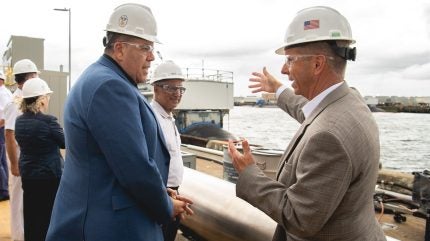
Newport News Shipbuilding has opened its doors to a bipartisan US delegation and Australian parliamentarians, marking a step in bolstering defence capabilities under the AUKUS agreement.
This visit underlines the urgency and importance of the AUKUS partnership, which seeks to provide Australia with a fleet of conventionally armed, nuclear-powered submarines.
The delegation included figures such as Representative (Rep.) Robert C. “Bobby” Scott and Rep. Rob Wittman, as well as Milton Dick, the Speaker of the Australian House of Representatives. Together, they engaged with HII leadership to discuss the company’s role in submarine sustainment and workforce development, which are components of Australia’s defence strategy.
AUKUS: An imperative
The AUKUS agreement, established to address China’s military presence in the Indo-Pacific region, has placed emphasis on developing Australia’s submarine capability. As tensions rise, US lawmakers and Australian officials recognise the necessity of deepening military partnerships to ensure regional security.
Rep. Wittman articulated the gravity of the situation, stating, “The AUKUS agreement is integral to deterring China’s growing military aggression in the Indo-Pacific.” His sentiments reflect a broader understanding among US representatives of Virginia’s submarine industrial base’s role in fulfilling this trilateral commitment.
Investing in the future workforce
The visit focused on workforce development, which remains critical as Australia prepares to launch its own nuclear submarine capabilities by the early 2030s. HII’s initiatives in training and development were showcased as a model for fostering a skilled workforce capable of meeting the demands of naval technology.
Jennifer Boykin, President of Newport News Shipbuilding, expressed gratitude for the delegation’s visit, highlighting the shipyard’s commitment to supporting AUKUS through stewardship of platforms and technologies. “We value every opportunity to demonstrate how HII is working in earnest to leverage our experience,” she stated.
Bridging gaps through education
The event also coincided with recent milestones for the Royal Australian Navy, as three officers graduated from the Royal Navy’s Nuclear Reactor Course in the UK, completing training to operate alongside British forces. This dual approach—enhancing local capabilities while learning from allied nations—is an aspect of Australia’s strategy to build its future submarine fleet.
Vice Admiral Jonathan Mead, Director-General of the Australian Submarine Agency, emphasised the importance of training opportunities facilitated through AUKUS partnerships. “We are grateful for the solid support of the United Kingdom and the United States,” he remarked, underscoring the collaborative spirit driving this initiative forward.
In January this year, three Royal Australian Navy officers graduated from the US Navy’s Nuclear Power Training Unit in Charleston, South Carolina. This marks a step towards Australia’s goal of operating nuclear-powered submarines (SSNs) under the AUKUS pact.
GlobalData’s intelligence on the Australian defence market highlights that the United Kingdom aims to deliver its first SSN-AUKUS to the UK Royal Navy in the late 2030s, while Australia plans to deliver its first domestically built SSN-AUKUS to the Royal Australian Navy in the early 2040s.
A united front
As the US and Australian governments strive to strengthen their military alliances, events like the HII delegation visit testify to both nations’ commitment. With the AUKUS agreement paving the way for a submarine capability, Newport News Shipbuilding stands ready to lead the charge in workforce development, ensuring the security of both nations for years to come.




